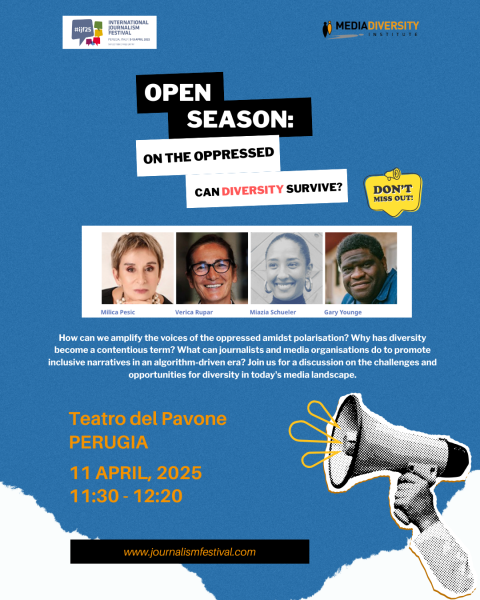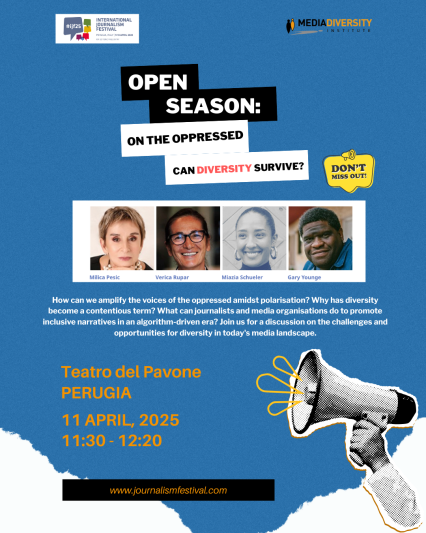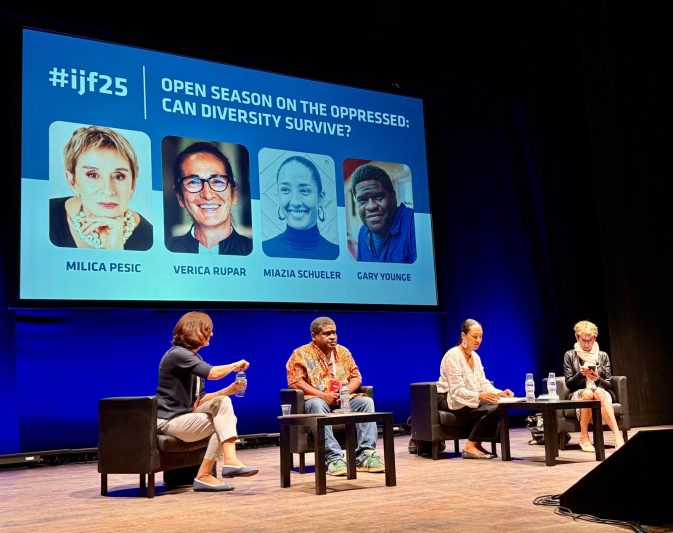At the 2025 International Journalism Festival in Perugia, we hosted a standout session asking a question many are now grappling with:
“Open season on the oppressed: can diversity survive?”
As social media platforms increasingly shape public debate, questions about who gets heard—and who doesn’t—have never felt more urgent. While Big Tech giants like Meta, X (formerly Twitter), and YouTube claim to protect freedom of expression, their algorithm-driven business models often reward outrage, sensationalism, and polarisation, leaving already marginalised communities even further sidelined.

“The platforms are contributing to the marginalisation of minority communities,” said moderator Milica Pešić, Executive Director of MDI.
“Has diversity become a dirty word?”
The panel explored the tension between freedom of speech and algorithmic control, the erosion of trust in journalism, and the responsibility of media professionals to speak truth to power, rather than echo it.
The panel recording is now available on YouTube:
What We Heard: Key Insights from the Panel
“We shouldn’t be stenographers for the powerful.”
Gary Younge, award-winning journalist and professor, challenged the state of journalism in the platform age:
“Verification is incredibly important in a time when making statements is more important than telling the truth.”
He argued that diversity must go beyond identity:
“When approaching diversity, we start with identity—but we shouldn’t stop there. We need a militant form of humanism. We act based on having a common humanity.”
Reflecting on racial politics in the US and Europe, he added:
“If you want a previous example of Trump, it’s Berlusconi. America is a product of Europe. Europe didn’t take DEI away—it never had it.”
“We must hold platforms to account.”
Miazia Schueler, researcher at AI Forensics, called for regulatory action:
“We need to conduct audits under Article 34 of the Digital Services Act—for platforms with over 45 million users.”
She spotlighted how far-right groups in France are using AI to reproduce harmful stereotypes about migrants, warning of the real-world impact of unchecked algorithmic systems.
On what diversity means to her, she shared:
“It’s the acknowledgement of my identity.”
“Diversity must be lived to be reported.”
Verica Rupar, professor and media ethics expert, reminded the audience:
“If the journalist does not live in the community, the coverage cannot be substantial and comprehensive.”
She reframed diversity as more than just numbers:
“Diversity means facts, conditions and practices. But it is also a demographic marker. It can trigger social polarisation, but it is also essential for democracy.”
A Clear Message
The panel concluded with a strong call to action:
“Diversity isn’t a buzzword. It’s a human right.
We need to fight for it—and be loud about it.
Because silence only serves the status quo.”
About the Speakers
- Milica Pešić (Moderator) – Executive Director of the Media Diversity Institute, with over 20 years of experience in journalism and diversity. She co-designed the MA in Diversity and the Media at the University of Westminster and has led global media development programmes across Europe, Africa, MENA, and Asia.
- Gary Younge – Award-winning journalist, author, and professor of sociology at the University of Manchester. Former Guardian columnist and recipient of the 2023 Orwell Prize for Journalism.
- Verica Rupar – Professor of Journalism at Auckland University of Technology and former Chair of the World Journalism Education Council (2019–2023). Long-time academic advisor to MDI.
- Miazia Schueler – Researcher at AI Forensics. Her work explores algorithmic injustice through a decolonial Black feminist lens. She holds a Research MA in New Media and Digital Culture from the University of Amsterdam.


